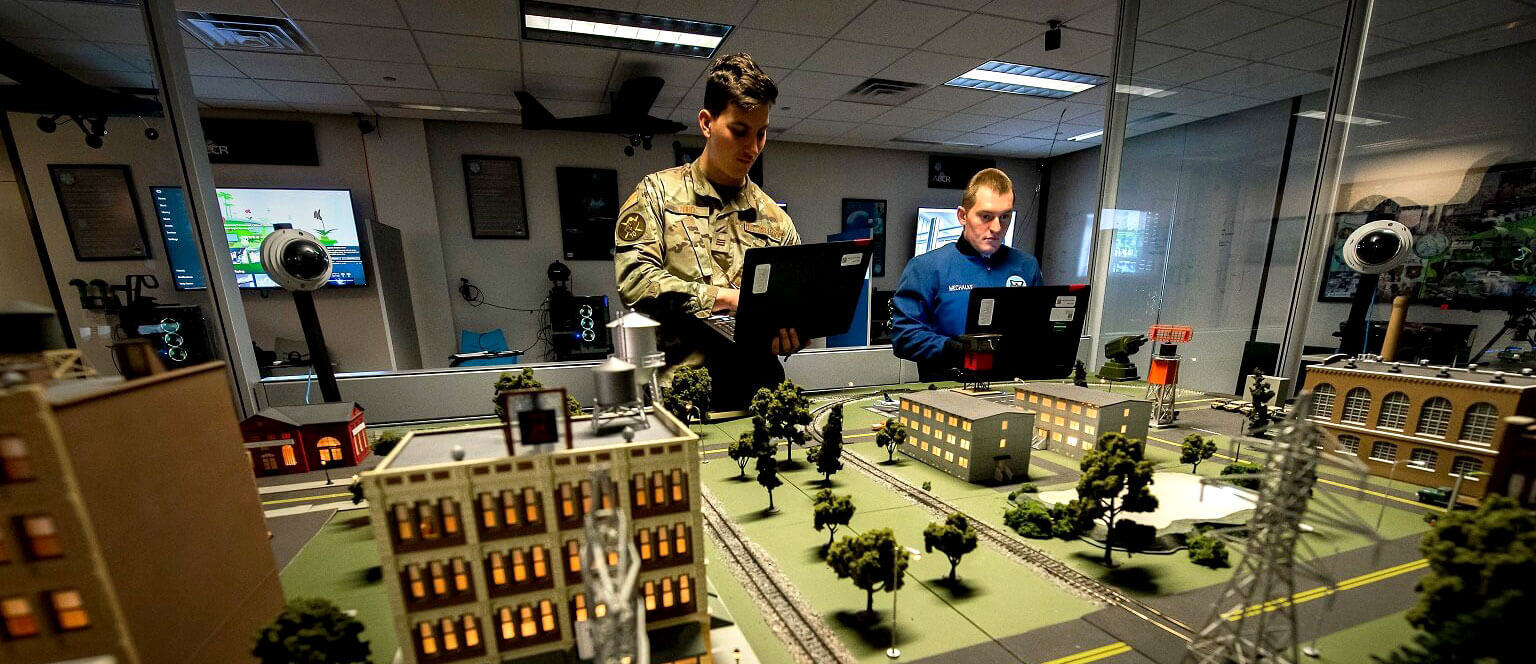Cyber Science

The Cyber Science major focuses on computer programming, embedded systems, networks, telecommunications, computer systems, computer investigations and cyber operations.
Cyber Science majors who become cyber operations officers will be able to:
- Conduct offensive and defensive cyber operations
- Establish and operate combat communications capabilities
- Operate, maintain and defend computer and communications networks
- Provide secure command and control capabilities
- Contribute to the development and acquisition of new systems
Cyber Science majors who become pilots have greater insight into their aircraft and weapons systems which are highly dependent on software systems. They will have an in-depth knowledge of how cyberspace risks may impact mission capabilities. Previous programming experience is neither assumed nor required to succeed in this program.
Potential Job Assignments
Within the Air Force
|
Outside the Air Force
|
SAMPLE COURSES
- Cryptography
- Cyber Warfare
- Cyber Operations
SUGGESTED COURSE SEQUENCE
| 4-DEGREE (FRESHMAN) | 3-DEGREE (SOPHOMORE) | 2-DEGREE (JUNIOR) | FIRSTIE (SENIOR) |
|---|---|---|---|
| For Lang 1 Beh Sci 110 History 100 Math 141 Comp Sci 110 For Lang 2 Chem 100 English 111 Math 142 Physics 110 Leadership 100 |
Comp Sci 210 MSS 251 ECE 315 Physics 215 English 211 Comp Sci 220 ECE 281 Math 340 Law 220 P/C/B Option 2 Mech Engr 220 Leadership 200 |
Cyber Sci 333 Comp Sci 467 ECE 382 Pol Sci 211 History 300 Econ 201 Cyber Sci 334 Cyber Sci Elective 1 Comp Sci 483 Philos 310 Math 356 Adv Open Option Leadership 300 |
Cyber Sci 435 Cyber Sci 438 Cyber Sci 431 Aero Engr 315 Soc Sci 311 Cyber Sci 439 ECE 348 Cyber Sci Elective 2 Astro Engr 310 Adv SocioCultural Op Leadership 400 |
ACCREDITATION INFORMATION
The Cyber Science degree is accredited by the Computing Accreditation Commission of ABET, www.abet.org.
To ensure the success of our graduates, we prepare them to achieve the following Program Educational Objectives within two to five years after graduation:
- Recognition as successful Air Force officers through demonstration of their ability to: rapidly acquire required knowledge, lead others effectively, apply ethical and moral standards, improve unit performance by application of organizational skills, make sound decisions based on critical thinking, communicate effectively
- Selection for career training on or ahead of schedule, and for a progression of assignments of increasing responsibility
- Demonstrated ability to solve Air Force technical problems
- Success in continuing education
Student Outcomes
Graduates of our program will have the ability to:
- Analyze a complex computing problem and to apply principles of computing and other relevant disciplines to identify solutions
- Design, implement and evaluate a computing-based solution to meet a given set of computing requirements in the context of the program’s discipline
- Communicate effectively in a variety of professional contexts
- Recognize professional responsibilities and make informed judgments in computing practice based on legal and ethical principles
- Function effectively as a member or leader of a team engaged in activities appropriate to the program’s discipline
- Apply security principles and practices to maintain operations in the presence of risks and threats
- Create intentional effects through social and technical manipulation of adversarial systems
CONTACT US
Major Bobby Birrer
bobby.birrer@afacademy.af.edu
(719) 333-7951
Lieutenant Colonel James Maher
james.maher@afacademy.af.edu
(719) 333-3590